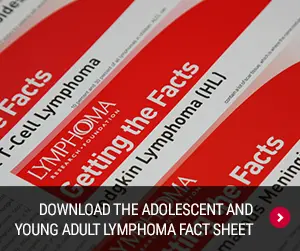
Adolescent and Young Adult Lymphoma
Emotional Impact
Many adolescents and young adults (AYAs) are at a time in their lives when they are becoming independent, establishing relationships and careers, exploring their sexuality, and forming their own views of the world. A Lymphoma diagnosis can interrupt this process; instead of dealing with those life issues, they must face not only their own distress and emotions about their diagnosis but those of their family and friends as well. They may also find themselves reevaluating their priorities and goals.
AYAs’ personal and social priorities may often compete with their treatment, and they may feel resentful that time they would normally spend with friends and attending social events or other activities may now be spent at doctor appointments or having tests or treatments. Even when treatment ends, it is normal to experience fear of recurrence, anxiety about returning to work or school, insecurity about physical changes caused by treatment, concerns about medical bills and health insurance and/or uncertainty about the future.
Parents, family, and friends will want to offer comfort and support; however, many AYAs find that people their own age who are also dealing with a cancer diagnosis or treatment may be able to provide unique insights and support. AYAs may benefit from receiving emotional support in the following places:
- Support groups
- Online forums
- Social media
Many people also benefit from speaking with a therapist or counselor trained in helping people with cancer.
Lymphoma Support Network
The Lymphoma Support Network (LSN) is a one-to-one peer support program for people with lymphoma and their caregivers. The LSN connects patients and caregivers with volunteers who have had similar experiences. Volunteers are there to offer words of encouragement, and understanding, to help give others strength to meet the challenges they may have to face.
The Lymphoma Research Foundation (LRF) Adolescent and Young Adult Lymphoma initiative is supported by Founding Sponsor The Paul Foundation.



